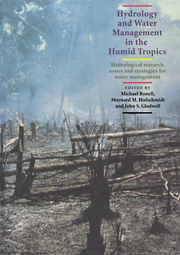 Hydrology and Water Management in the Humid Tropics
Hydrology and Water Management in the Humid Tropics Book contents
- Frontmatter
- Contents
- List of Authors
- Foreword by Federico Mayor, Director-General, UNESCO
- Preface
- Cartographic Credit
- Acknowledgements
- SECTION I INTRODUCTION
- SECTION II HUMID TROPICS SETTING
- SECTION III REGIONAL HYDROLOGY
- SECTION IV PHYSICAL PROCESSES
- SECTION V PHYSICAL PROCESSES – HUMAN USES: THE INTERFACE
- SECTION VI MANAGEMENT ISSUES
- 22 Water Resource Management
- 23 Water Management Issues: Population, Agriculture and Forests – A Focus on Watershed Management
- 24 Urban Water Resources in the Humid Tropics: An Overview of the ASEAN Region
- 25 Urban Water Problems in the Humid Tropics
- 26 Rethinking Urban Water Supply and Sanitation Strategy in Developing Countries in the Humid Tropics: Lessons from the International Water Decade
- 27 Water Resource Management Issues in the Humid Tropics
- SECTION VII APPENDICES
- Place index
26 - Rethinking Urban Water Supply and Sanitation Strategy in Developing Countries in the Humid Tropics: Lessons from the International Water Decade
Published online by Cambridge University Press: 23 December 2009
- Frontmatter
- Contents
- List of Authors
- Foreword by Federico Mayor, Director-General, UNESCO
- Preface
- Cartographic Credit
- Acknowledgements
- SECTION I INTRODUCTION
- SECTION II HUMID TROPICS SETTING
- SECTION III REGIONAL HYDROLOGY
- SECTION IV PHYSICAL PROCESSES
- SECTION V PHYSICAL PROCESSES – HUMAN USES: THE INTERFACE
- SECTION VI MANAGEMENT ISSUES
- 22 Water Resource Management
- 23 Water Management Issues: Population, Agriculture and Forests – A Focus on Watershed Management
- 24 Urban Water Resources in the Humid Tropics: An Overview of the ASEAN Region
- 25 Urban Water Problems in the Humid Tropics
- 26 Rethinking Urban Water Supply and Sanitation Strategy in Developing Countries in the Humid Tropics: Lessons from the International Water Decade
- 27 Water Resource Management Issues in the Humid Tropics
- SECTION VII APPENDICES
- Place index
Summary
ABSTRACT
A full assessment of the International Water Decade's experience requires us to look beyond water supply and sanitation coverage figures and to begin to identify new ways of thinking about the sectors that have emerged. Four major lessons can be derived from the Decade. First, technology alone is not enough; managerial, organizational and social issues must also be considered in designing efficient systems. Second, appropriate and lew-cost technology maximizes the value of investments. Third, innovative cost recovery programs are essential to sustainable projects. Fourth, community participation in planning, operation and maintenance tasks is the key to successful overall system performance. Whereas the objectives were technology oriented and were defined in terms of “coverage” at the beginning of the Decade, the emerging approach goes beyond coverage to emphasize institutional aspects and the “human factor” as central to achieving “sustainable, effectively used services.”
INTRODUCTION
The International Water Supply and Sanitation Decade (1980–1990) was the most notable international and national effort that sought to improve the provision of clean water supply and adequate sanitation facilities in the developing countries. Many of these countries are located within the humid tropics and other warm humid regions and will represent nearly 33% of the world's population by the end of this century. The continuing population shift from developed to developing countries and from rural to urban areas, and the concomitant need to sustain the urban environments present a formidable challenge to cope with the requirements and impacts of water-related activities that will accompany such transformations in the humid tropics and other warm humid regions.
- Type
- Chapter
- Information
- Hydrology and Water Management in the Humid TropicsHydrological Research Issues and Strategies for Water Management, pp. 547 - 555Publisher: Cambridge University PressPrint publication year: 1993
